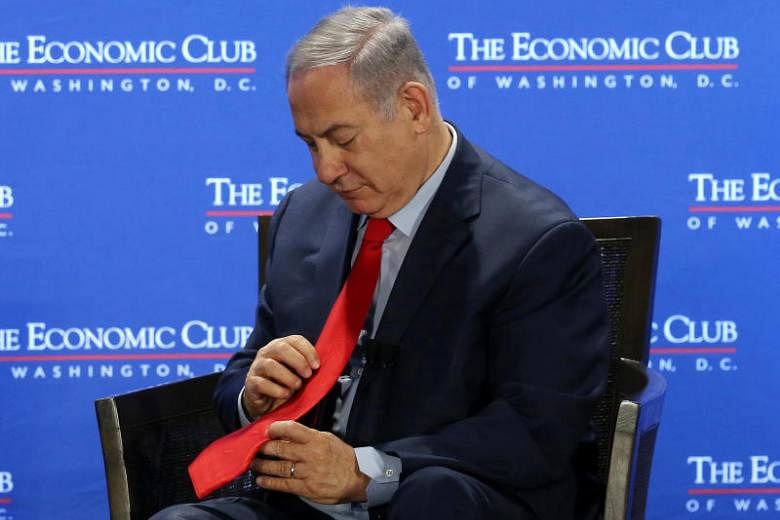JERUSALEM (AFP) - Israeli Prime Minister Benjamin Netanyahu returns on Friday (March 9) from the United States to face what may be the most crucial stretch of his long political career, with corruption probes encircling him and talk of elections building.
With no fewer than four investigations looking into his affairs and a possible indictment on the horizon, Mr Netanyahu has been seeking to remind Israelis of what supporters view as his clout and leadership.
He sat alongside US President Donald Trump and spoke of the "historic" White House decision to designate the disputed city of Jerusalem as Israel's capital, a major diplomatic coup for Mr Netanyahu that enraged the Palestinians.
Mr Trump said he may attend the opening of the new embassy in Jerusalem on May 14, which coincides with the 70th anniversary of the creation of Israel.
A day later, receiving a warm welcome from some 18,000 people at a conference for pro-Israel lobby AIPAC, Mr Netanyahu spoke of what he describes as his achievements at home and abroad while pledging to "stop" Israel's greatest enemy, Iran.
But even as he prepared to meet Mr Trump, a former aide who had been among his close allies was signing a state witness agreement with the police to testify against him.
He is the third Netanyahu associate to do so in a matter of months.
The attorney general is now weighing whether to follow a police recommendation to indict Mr Netanyahu for bribery in two of the four cases, with investigations continuing into the others.
As the investigations close in, there has been widespread speculation that Mr Netanyahu, prime minister for a total of 12 years, will opt for early elections to bolster his standing ahead of a decision on indictments.
Some accuse Mr Netanyahu of allowing a political crisis to brew within his coalition to enable elections soon - or to at least give himself options.
His right-wing coalition has been split over a Bill to exempt ultra-Orthodox Jewish religious students from military service, with the issue threatening to pull apart the government.
"If he wants to solve it, he can solve it. There is no real crisis here," a source in the opposition said on condition of anonymity.
He said politicians were assuming the attorney general would reach a decision on indictments in the summer.
"It makes sense for him to go to elections before that," the source said of Mr Netanyahu. "That's our working analysis."
Some polls suggest Mr Netanyahu could remain in power after fresh elections even with the investigations hanging over him. He is not required to resign if indicted.
Mr Netanyahu, a savvy campaigner with long experience in the raucous world of Israeli politics, says he wants his coalition to last its full term, due to expire in November 2019.
"If the coalition leaders agree, that is what will happen," Mr Netanyahu told journalists in the US on Wednesday (March 7).
"If they don't, then we'll have early elections."
He has publicly stuck by what many analysts see as a three-prong strategy.
He has sought to portray business as usual when it comes to his work while denigrating the investigations as a bid by enemies to force him out.
Meanwhile, he has sought to burnish his credentials to convince Israelis he is the best option for prime minister.
"This is his approach and he must stick to it," said Professor Gideon Rahat of Jerusalem's Hebrew University and the Israel Democracy Institute think tank.
"One option is to play this game and the other is what? To resign and to take the risk of going to jail like Ehud Olmert?" he added, referring to the former Israeli premier who served prison time for corruption.
The graft probes are varied but amount to allegations Mr Netanyahu granted financial or other benefits to businessmen in exchange for gifts or favours.
In one of the cases in which police have recommended his indictment, he and his family are accused of receiving gifts such as expensive cigars, jewellery and champagne from Hollywood producer Arnon Milchan and Australian billionaire James Packer.
The other alleges he sought to negotiate a deal with the publisher of a top-selling newspaper for favourable coverage.
Two other cases still being probed also centre on allegations of bribery.
Further adding to the pressure facing him, there are two additional cases indirectly linked to Mr Netanyahu - accusations of corruption in the purchase of German submarines and alleged misuse of public funds by his wife.
Elections would be a huge gamble, Prof Rahat said, though victory would cement his argument that he is being hounded by the country's elites but supported by the public.
"On the other hand, if he loses the elections, he loses this line of defence," he said.

